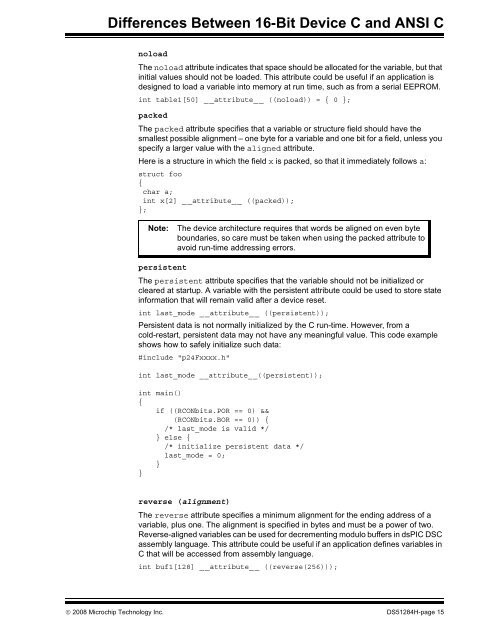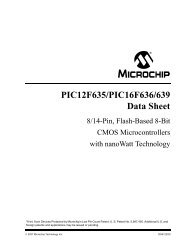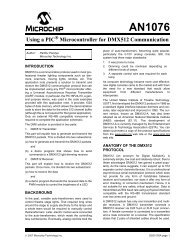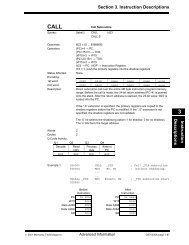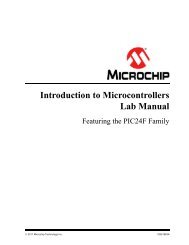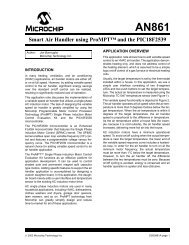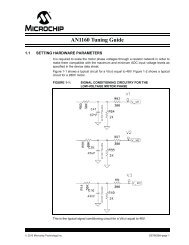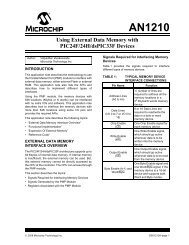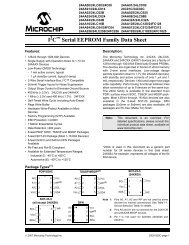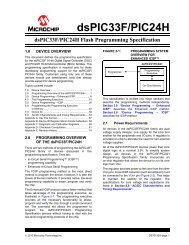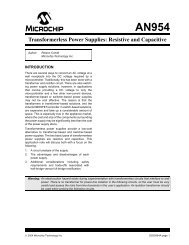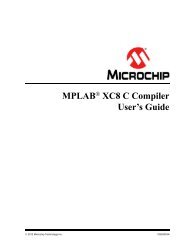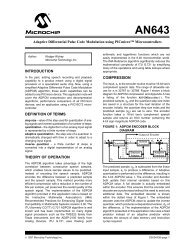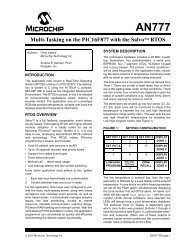MPLAB C Compiler for PIC24 MCUs and dsPIC DSCs ... - Microchip
MPLAB C Compiler for PIC24 MCUs and dsPIC DSCs ... - Microchip
MPLAB C Compiler for PIC24 MCUs and dsPIC DSCs ... - Microchip
Create successful ePaper yourself
Turn your PDF publications into a flip-book with our unique Google optimized e-Paper software.
Differences Between 16-Bit Device C <strong>and</strong> ANSI C<br />
noload<br />
The noload attribute indicates that space should be allocated <strong>for</strong> the variable, but that<br />
initial values should not be loaded. This attribute could be useful if an application is<br />
designed to load a variable into memory at run time, such as from a serial EEPROM.<br />
int table1[50] __attribute__ ((noload)) = { 0 };<br />
packed<br />
The packed attribute specifies that a variable or structure field should have the<br />
smallest possible alignment – one byte <strong>for</strong> a variable <strong>and</strong> one bit <strong>for</strong> a field, unless you<br />
specify a larger value with the aligned attribute.<br />
Here is a structure in which the field x is packed, so that it immediately follows a:<br />
struct foo<br />
{<br />
char a;<br />
int x[2] __attribute__ ((packed));<br />
};<br />
Note: The device architecture requires that words be aligned on even byte<br />
boundaries, so care must be taken when using the packed attribute to<br />
avoid run-time addressing errors.<br />
persistent<br />
The persistent attribute specifies that the variable should not be initialized or<br />
cleared at startup. A variable with the persistent attribute could be used to store state<br />
in<strong>for</strong>mation that will remain valid after a device reset.<br />
int last_mode __attribute__ ((persistent));<br />
Persistent data is not normally initialized by the C run-time. However, from a<br />
cold-restart, persistent data may not have any meaningful value. This code example<br />
shows how to safely initialize such data:<br />
#include "p24Fxxxx.h"<br />
int last_mode __attribute__((persistent));<br />
int main()<br />
{<br />
if ((RCONbits.POR == 0) &&<br />
(RCONbits.BOR == 0)) {<br />
/* last_mode is valid */<br />
} else {<br />
/* initialize persistent data */<br />
last_mode = 0;<br />
}<br />
}<br />
reverse (alignment)<br />
The reverse attribute specifies a minimum alignment <strong>for</strong> the ending address of a<br />
variable, plus one. The alignment is specified in bytes <strong>and</strong> must be a power of two.<br />
Reverse-aligned variables can be used <strong>for</strong> decrementing modulo buffers in <strong>dsPIC</strong> DSC<br />
assembly language. This attribute could be useful if an application defines variables in<br />
C that will be accessed from assembly language.<br />
int buf1[128] __attribute__ ((reverse(256)));<br />
© 2008 <strong>Microchip</strong> Technology Inc. DS51284H-page 15


